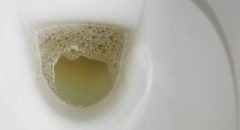
No amount of lead in drinking water is safe for people with kidney disease, a new study warns. This new discovery is something that should be even more alarming to African Americans whose high rates of diabetes, high blood pressure and heart disease give them an increased risk of developing kidney failure. Black people are three times more likely to develop kidney cancer and makeup 35 percent of patients in the U.S. receiving dialysis even though African Americans only account for 13.2 percent of the overall population, according to the National Kidney Foundation.
Low levels of lead in drinking water are widespread in the United States. These findings suggest that U.S. Environmental Protection Agency (EPA) rules on allowable lead levels in drinking water pose a risk to the 30 million to 40 million Americans with kidney disease.
"While drinking water may seem uniformly healthy, low levels of lead contamination found in the majority of drinking water systems in the United States may have toxic effects for those with chronic kidney disease," lead author Dr. John Danziger, of Beth Israel Deaconess Medical Center in Boston says.
"More rigorous efforts to improve the water system infrastructure may be needed to protect individuals from [this] unrecognized hazard," Danziger adds
The study authors analyzed health data from nearly 600,000 people in the United States who began kidney dialysis between 2005 and 2017. They also examined EPA data on lead concentrations in community water systems in the five years before the patients started dialysis.
The researchers focused on the potential effects of lead on levels of hemoglobin, the oxygen-carrying protein in red blood cells that are affected by lead poisoning.
Patients in cities with detectable levels of lead in their community's water had significantly lower hemoglobin concentrations before starting dialysis and during the first month of dialysis. They also received higher doses of medications to treat anemia, which occurs when red blood cell counts or hemoglobin levels are lower than normal.
These associations occurred at lead levels below the EPA's lead/drinking water threshold for regulatory action, according to the study.
The study also found that Black patients were exposed to higher lead levels in drinking water than white patients."Combined with the increased susceptibility to kidney disease among Blacks, this represents an important environmental injustice," Danziger says.
Avoiding Water With Lead
If you live in a city that has water with high levels of lead, try these tips to reduce your risk of developing kidney disease:
Do:
- Flush: Anytime you use tap water for drinking, cooking, preparing baby formula, etc., you should always flush the tap, especially if the water has been sitting in the pipes for six hours or longer. Once you turn on the faucet you should let the cold water run for 15 to 30 seconds if you have been using the water a lot for showers or toilet flushing. If you haven't used the water much, you should flush it for two minutes until it is as cold as it can get. Warm or hot water can contain higher levels of lead so you should use cold water for drinking, cooking and making baby formula. You can also fill a pitcher with water after you have flushed it and store it in the refrigerator for later.
- Clean your faucet: You should be cleaning your faucet strainers often to get rid of lead particles and sediment, which can build up on the strainers over time. When you take the strainers off to clean, remember to keep the faucet running to flush loose lead solder particles out of the pipes as well.
- Plumbing: You should test the water's lead levels and clean the strainers after you've had any plumbing work done at your house. You might also consider replacing the lead water service or lead pipes in your house, especially if you live in an older house.
- Water Filters: You can install a water filter that is certified to remove lead. Be sure to change cartridges regularly, in accordance with the manufacturer’s instructions. This is a list of filters that reduce the lead levels in water.
Don't:
- Boil Water: Boiling water will not remove the levels of lead in the water. In fact, hot water is more likely to contain higher levels of lead.









